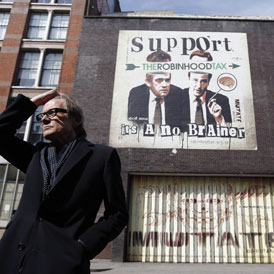European financial tax – is the City worth saving?
As David Cameron trades blows with other European leaders over a financial transactions tax, Channel 4 News asks if the City should be protected.

French President Nicolas Sarkozy and German Chancellor Angela Merkel are pushing for a Europe-wide tax on share, bond and derivatives trading, as one way of resolving the debt crisis in the EU.
The British government says it is not opposed to a tax of this kind if it is adopted globally, but objects to any measures that would only apply to transactions within the EU.
Its argument is that a tax would have a disproportionately negative effect on the City of London, the world’s biggest international banking centre, and lead to an exodus of jobs to countries outside the EU.
Prime Minister David Cameron has said he will veto a proposed new European treaty if France and Germany do not offer Britain safeguards.
Anti-poverty campaigners in the UK say by levying a small charge on transactions, the banks would be forced to pay back some of the money they took in taxpayer bailouts in 2008.
Million employees
More than a million people work in financial services in the UK; a third in London, the rest in cities including Edinburgh, Leeds, Manchester, Glasgow and Birmingham.
In 2009-10, the sector contributed £53bn to the exchequer, 11 per cent of total tax receipts. Financial services generated a trade surplus of more than £35bn in 2010.
The Robin Hood Tax campaign, which is calling for a financial transactions tax, says the financial crisis cost Britain 27 per cent of its output in 2008 and the bank bailouts cost £1.5tr, equivalent to 94 per cent of national output.
Technically easy to implement, economically bearable, financially productive and politically just. EU Commissioner Michel Barnier
One of the strongest proponents of the tax is Michel Barnier, the European commissioner responsible for financial services.
He has said it would be “technically easy to implement, economically bearable, financially productive and politically just”, arguing that the finance industry should “give back” something to Europe after the bank bailouts.
Shares and bonds
The proposal is for a 0.1 per cent charge on share and bond trades and 0.01 per cent for derivatives, with assets owned by eurozone banks that are traded in London also facing the tax.
The political leadership of the European Commission, which is wary of the financial services industry and believes it should be contributing more to the public purse, has estimated £57bn could be raised.
But the commission’s own analysts carried out an impact assessment in September that concluded it could have some unwelcome side effects.
Job losses
They estimated that EU output could fall by between 0.17 per cent and 1.76 per cent if the tax was imposed, with job losses of 71,000-478,000. They also concluded that 70-90 per cent of financial transactions carried out in the EU could move to other parts of the world.
Critics, including the Treasury, question how the tax could raise £57bn if this number of transactions were no longer carried out in Europe.
Chancellor George Osborne has said it would cost the City £26bn a year, while former prime minister Sir John Major has said 80 per cent of the money raised would come from Britain.
I think a transactions tax would only work if agreed globally. Simon Tilford, Centre for European Reform
It is not just euro-sceptics who are opposed. Simon Tilford, chief economist at the pro-European Centre for European Reform, told Channel 4 News: “I think a transactions tax would only work if agreed globally. Europe moving unilaterally would achieve little. It would almost certainly lead to activity relocating from major European financial centres to those outside the EU. Because the Americans are stoutly opposed, it would be unwise for Europe to push ahead with this.”

But does ‘the City’ need the protection David Cameron is offering it? Not as far as the Robin Hood Tax campaign is concerned. Spokesman David Hillman said on Wednesday: “Cameron and Osborne should be going to Europe with all guns blazing to protect the interests of the UK public, not to lobby on behalf of the City.”
The campaign supports a tax in Britain, Europe and worldwide, arguing it would have “the power to raise hundreds of billions every year globally”. It adds: “A tiny tax on the financial sector can generate £20bn annually in the UK alone. That’s enough to protect schools and hospitals, enough to stop massive cuts across the public sector. The Robin Hood Tax is justice. The banks can afford it.”
Wider economy
But Simon Tilford believes that as well as posing risks to the health of the financial services industry, a Europe-only transactions tax could damage the wider economy.
“If it were to lead to a relocation of sizeable chunks of activity, it could have a significant knock-on effect on the UK economy without addressing some of the underlying issues. It’s not a question of putting the interests of the financial sector ahead of the country as a whole.”
Mr Tilford said if the tax were taken up globally, “the risks to particular financial centres would be lower and it could be a useful way of raising revenue”.